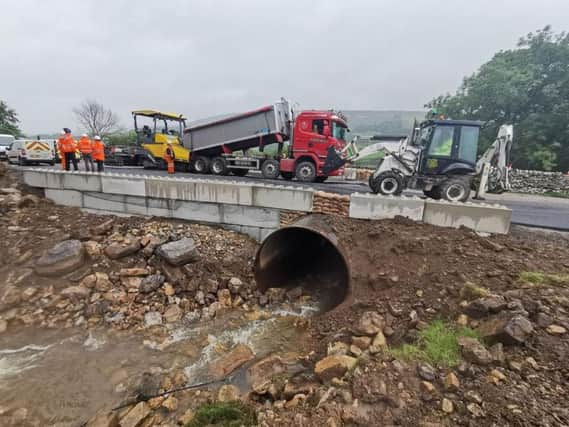Climate change leading to more severe flooding in Yorkshire, study finds


Data from thousands of locations across Europe found flood events are becoming increasingly severe in the north-west - including the UK - but are decreasing in severity in the south and east of the continent.
Drystone walls collapsed after flash flooding in Swaledale in July, which brought huge disruption to communities, while residents of Whaley Bridge in Derbyshire faced the prospect of over 1m tonnes of water inundating their town as the Toddbrook dam teetered on the brink of collapse.
Advertisement
Hide AdAdvertisement
Hide AdTwelve bridges washed away and paths destroyed - the true cost of Yorkshire Dales flashfloodingSome 4.4in of rain fell in less than three hours – surpassing the infamous Boxing Day storms of 2015 which saw more than 3,000 properties flooded in the Calder Valley.
The extent of climate change on the severity of flooding has been previously unclear due to a lack of data.
But the Vienna University of Technology claim their database is the most complete on European flooding so far, involving research institutions in 24 European countries including the University of Bath and University of Liverpool.
Researchers analysed records from 3,738 river flood measurement stations across Europe over five decades.
Advertisement
Hide AdAdvertisement
Hide AdNorthern England and southern Scotland have seen an increase in flooding of more than 11%, while the study observed a 23% decrease in Russia.
The UK has seen a pattern of severe flooding over the past 10 years which the Environment Agency says is linked to an increase in extreme weather events.
Shocking photos show flooding damage to Tour de France Grand Depart bridgeThe study, published in the journal Nature, suggests that an increase in autumn and winter rainfall caused by climate change has led to increasing floods in the UK and north-western Europe.
In southern Europe, flood levels are decreasing due to declining precipitation and water temperatures are causing an increase in evaporation of water in soil, the report claims.
Advertisement
Hide AdAdvertisement
Hide AdDecreasing snow cover in eastern Europe, also caused by warmer temperatures, have also led to decreasing floods in the area, according to the authors.
They conclude that the data demonstrates the need to consider climate change impacts when designing flood management strategies.
Lead author Professor Gunter Bloschl said: "We already knew that climate change is shifting the timing of floods in a year, but the key question had been does climate change also control the magnitude of flood events?.
"Our study did in fact find there are consistent patterns of flood change across Europe and these are in line with predicted climate change impacts, such as a contrast between increasing severity of flooding in the north and decreases in the south."